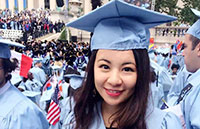New science museum rises, dome and all
By Liang Shuang and Cao Yin (chinadaily.com.cn) Updated: 2016-07-22 21:18After lying dormant for seven years, the iconic original venue of the China Science and Technology Museum in Beijing's Chaoyang district has begun a metamorphosis. When work is completed, the classic site will enter the spotlight once more as a place for planting dreams in a new generation of young scientists.
In 2009, a new museum building was completed 5 kilometers to the north, and original site was shuttered. But nostalgia for the old museum, with its distinctive dome theater, remains strong.
"I went there almost every weekend in my elementary school years," said Li Shuang, who now works in finance. "I was really fascinated by the exhibits. Many kids lined up for the Van de Graaff generator, where your hair stood up when you touched the static electricity sphere."
Opened in 1988, the museum had been a favorite of residents, especially teenagers. After the round-topped theater opened in 1995 and the museum was expanded in 1990, its eye-catching shape became a well-known landmark in Beijing.
For its time, the museum was the most advanced in China, giving visitors a jaw-dropping experience.
"It didn't pale by comparison with even Disneyland or Universal Studios," said Cai Heng, an entrepreneur from Beijing.
Now, the shell of the old museum's dome is being removed, and scaffolds have been set up around the compound for other reconstruction work.
For many Beijingers, the museum — especially the dome — holds fond memories.
"When the old venue closed and the nearby bus stations were renamed, I was a bit depressed," said Huang Shuo, a 25-year-old Beijing native. "The visuals and sound effects in the dome theater were so vivid that it scared me a bit when I watched a movie about the Grand Canyon there."
After a seven-year rest, the venue is about to get a new start — a renovation that builders say will transform it into an exciting a new science compound.
The dome theater will be rebuilt based on the original look, but with modern construction materials to replace the rusty old structure. New facilities will be installed to improve electricity and fire safety. The renovation will also unify the style of the whole compound.
When completed, the facility will be called the Beijing Science Center. The plan features permanent exhibits in the life sciences, nature and environment, and new technologies for daily life. It will also have independent educational zones for students and young children — and, of course, the dome theater, which is scheduled to open by mid-2017.
"I hope more cutting-edge devices and concepts can be included in the exhibits, like virtual reality," Li said. "It's a great platform for kids to learn about the trend at an early age."
Beijing hopes to increase to its civic scientific literacy rate to 24 percent in 2020 from 18 percent in 2015, continuing to catch up the developed countries, according to a plan by the Beijing Association for Science and Technology. The rate in the United States was about 28 percent nationwide, according to a report from the University of Michigan.
Contact the writers at liangshuang@chinadaily.com.cn
- Delayed retirement to be rolled out slowly
- Xi orders China's developed east to better aid poor west
- Short-circuit blamed for catastrophic tour bus fire
- 30,000 km expansion of rail network planned
- Brace for deluge, Xi tells nation
- Li says new plan shows innovation's top priority
- Manila urged to 'walk out of its wrong path'
- China repatriates 141 fugitive officials since 2015
- Li says private investment needs boost
- Ex-minister: Provocations prompted naval drill










